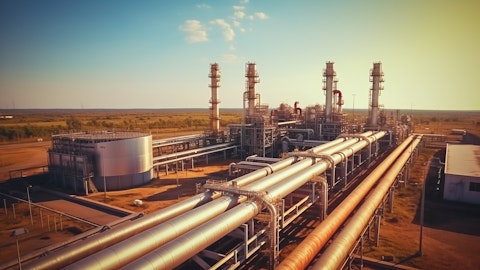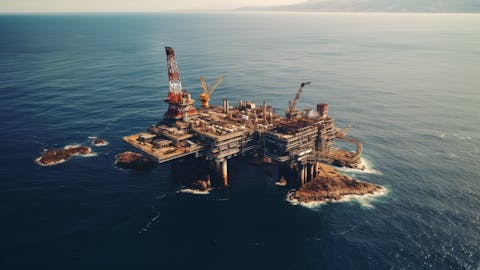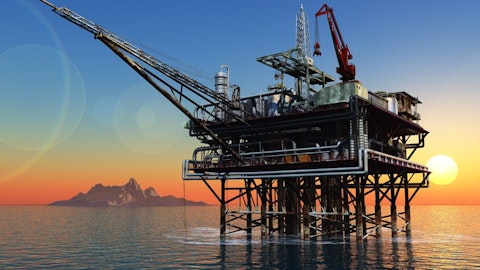Jim Evans: Yes. I mean, from time to time, I think we see some groups that raise capital and deploy it in a meaningful way. There was one group that we saw ended up paying north of 75% of where we were coming out at and we’re happy to let them have it. And frankly, they shot their one and only bullet and we haven’t heard from them again. So they can digest that for as long as they do. And then if they want to sell it, and maybe at that point, it’s worth taking another look at it, but not at those prices.
Nick O’Grady: Yes. I mean, I would just say this, I don’t think there’s been an asset that we’ve coveted yet that we really felt was very attractive to us that we haven’t built out we were outmatched for when we really of the quality that you’ve seen us execute on where we really had to stretch or go out of our comfort zone for. And I think that that’s a testament to where we are in the marketplace.
Derrick Whitfield: Terrific. And as my follow-up, really thinking about Permian macro. Regarding the pipeline outages and tighter regress conditions that are expected until Matterhorn comes on in 2022-23, are you guys expecting industry to adjust turn-in-line activity to match supply growth with Egress Group?
Nick O’Grady: You’re definitely seeing especially for some of the smaller operators, they’re having to navigate around it. I think we’re blessed with the fact that most of our operators in the Permian are bigger operators with more integrated midstream systems and better access points. But even they have to navigate around these issues, Derrick. And so it’s not a small issue, and I don’t want to sugarcoat it. And I think, were for better for worse, and I would like to say we were geniuses, but we basically have almost zero exposure this year. Financially speaking, at least, we effectively hedged all of it away. And I’d love to say we did it completely on purpose, but we just really we were a little bit concerned coming into the year, and I think we just had a heavy hand on it when we were hedging it probably because we’re so acquisitive last year.
But I think that it’s going to take some time to make some of it if you rightly highlighted some of it is it’s been made worse by maintenance. But I don’t think it’s necessarily going to get magically better this year. So next year, I think it’s still going to be a wide issue for some time. I think it’s going to take a couple of years, you’re going to need more and more to be built out. So I do think it’s going to limit some growth, particularly in the Delaware for the next year or so.
Derrick Whitfield: Makes sense. Very helpful.
Operator: Your next question comes to the line of Donovan Schafer of Northland Capital. Please go ahead.
Donovan Schafer: Hi guys, thanks for taking the questions. So I want to ask about — and I know we’ve already had a couple of people ask about the better-than-expected well performance. So it’s like beating a dead horse. But I kind of want to – in the sense of like to what extent should we care? Let’s forget about the welding pulled forward or whatever, if we’re just talking about on like a given well performance of that well versus your own expectations, if we just focus on that, and you said, I think, Nick, you said flat out better well performance. Who gets sort of the credit for that. Is it just a chance phenomenon and there’s a statistical distribution, and it just happens to be that the roles of the guys were better at this time around?
Or can you identify changes in sort of well design? Or do you feel like this supports strength to particular operators or is it alternatively like a matter of conservative underwriting? Another way to put it is, should this be seen as an achievement of some kind, somehow tied to a human agency? Or is this just a matter of chance. And if it’s some sort of like achievement, who gets that credit? Is it a reflection of your business model? Is it a reflection of your operators? That would be really great.
Nick O’Grady: I mean I think I would certainly want to give credit to the operators for their great performance. I mean, certainly, they do all the hard work, and I don’t want to not give credit where credits do. But to our engineering team, we work really hard to set a standard and underwrite accordingly and then try to meet and beat those expectations. And so I think that we try to – and then obviously, for you guys to under promise and over deliver, and it’s not to lowball or anything like that, but you really do, is this a risky business. It is a risky business and well the oil and gas business is still with optimists. And I always joke that as a nonoperator, you really need to be pessimistic because you find out that many operators they make a change in well design and they see better IPs and they carry it forward and think everything is going to be better or they do a one refrac is good, and they think all refracs is going to be better, and it turns out that it’s locational.



